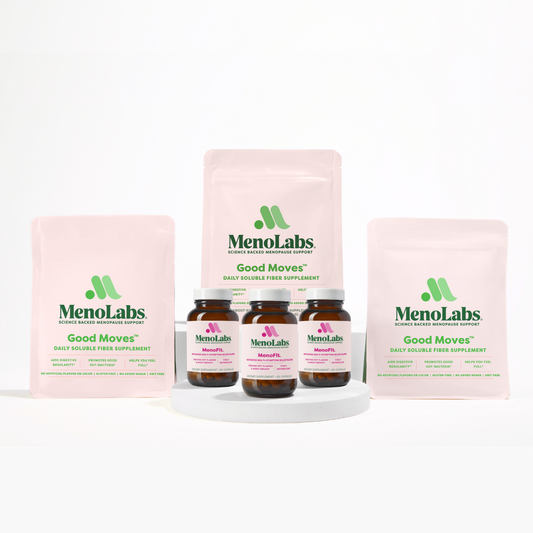Early menopause is the onset of menopause in women under the age of 45. Early menopause can be caused and influenced by many things including genetic traits, autoimmune conditions, other underlying and preexisting conditions, certain surgeries (hysterectomies and bilateral oophorectomies), chemotherapy, radiation, and habitual smoking. Fewer than 200,000 cases of early menopause are reported every year. However, early menopause can present its own health challenges.
While there are many factors that influence early menopause, the link between chronic stress and early menopause has become a heavily researched topic. The question remains, can stress cause or contribute to the onset of early menopause?
Stress Hormones and Sex Hormones
The connection between stress hormones and sex hormones is an interesting one, and one that isn’t full understood yet. More research is being done everyday to evaluate the impact of stress hormones on all systems of the body, especially the endocrine system. So how can stress contribute to the onset of menopause?
Production levels of stress hormones and sex hormones (estrogen and progesterone) fluctuate depending on the phase of a woman’s menstrual cycle. Higher levels of stress hormones are correlated with lower levels of estrogen (mainly estradiol). This is observed especially in young women. Why does this inverse relationship between estrogen and stress hormones exist?
One of the female sex hormones, progesterone, acts like a precurosr to certain stress hormones (especially during specific stages of the menstrual cycle). Studies have observed that progesterone and stress hormone levels tend to peak during specific hours of the day. It was most commonly seen that these hormone levels peaked during the mornings and trended downward into the afternoon and evening (on average).
When stressors were introduced, both progesterone and stress hormones were shown to increase. The adrenal glands produced and released more stress hormones just as more progesterone was being released into the bloodstream. This relationship suggests that as levels of sex hormones change, so do the production of stress hormones.
Is There A Direct Relationship Between Stress & Early Menopause?
Is stress a direct cause of early menopause? Not necessarily, but it can contribute to many other factors that can cause women to enter into early menopause. Women with natural estrogen deficiencies, most likely from genetics, are observed to have a higher risk of early menopause when exposed to chronic stress. This is because chronic stress can make stress hormones behave similarly to toxins in the body that make it more difficult for cells to regulate themselves.
Women with certain autoimmune disorders may also experience early menopause or premature ovarian failure when exposed to chronic stress. Stress hormones modulate cellular energy by impacting the functions of cell mitochondria. When this occurs, it limits the effectiveness of cells and how they perform their roles. Chronic stress levels may contribute to the premature decline of sex hormones in women with certain autoimmune conditions and other preexisting conditions like rheumatoid arthritis, turner’s syndrome, and endometriosis.
Can You Lower the Risk of Early Menopause?
Depending on individual health, medical history, and genetics, lowering the risk of early menopause may be more difficult for some women than others. However, there are steps women can take to help better control their symptoms and potentially help reduce the risk of early menopause.
Hormone Options
Some doctors recommend that women help lower the risk of early menopause by using hormonal treatments and medications. Some women find taking low dose birth control helps them better maintain sex hormone levels and prevent significant hormonal declines from occuring. Other options like hormone replacement therapy (HRT) do exist and should only be taken with serious consideration and guidance from a licensed medical professional. Not all women need to use HRT to supplement their natural hormone levels, but some women do. Speak to your doctor about the side effects of HRT as they can be significant and lead to additional health concerns.
Find Ways To Manage Stress
Chronic stress can have an impact on the body’s regulation and contribute to an increased risk of early menopause. Managing stress is an essential step to reducing stress’ impact on the body. Some women may find that certain techniques are better to help them reduce stress than others. However, there are two things that women can change and improve to help them manage stress’ impact on their overall health, diet and exercise.
Changing Diet
Our diets can influence the production of stress hormones as much as our other sources of stress. Diets high in sugars, fats, and simple carbohydrates can contribute to increases in stress hormone levels. How so? Let’s take a look at what happens when the body receives high quantities of refined sugars.
When the body receives high quantities of sugars, blood sugar spikes. When blood sugar levels spike, it causes an increase in blood pressure and heart rate. Both higher blood pressure and high heart rate trigger the adrenal glands to produce stress hormones. This causes the body to release more stress hormones throughout the body, and the brain has more difficulty releasing mood-stabilizing hormones to combat them.
By simply reducing the amount of refined sugars, saturated fats, and simple carbohydrates in daily diet, women can better help their bodies regulate the release of stress hormones. Instead of reaching for something sweet for breakfast or even a quick snack, turn to foods with more nutrients, especially fiber. Fruits and vegetables are the most nutrient-dense food sources. So try incorporating more of them into meals.
Regular Exercise
Maintaining a regular exercise routine is also beneficial in combating stress hormones. When the body engages in regular exercise, it starts to release mood-stabilizing hormones that help lower stress hormone levels. It also helps improve resting metabolic rate, which helps the body regulate blood sugar levels, fat deposition, and various regulatory processes.
It’s recommended that women engage in 20 to 30 minutes of moderate intensity exercise at least four times a week, if not everyday. This can help women support improved moods, a healthy weight, and maintain muscle mass. Each of which is essential to women as they undergo the menopausal transition.
Understanding Stress Is Essential
Stress management, although challenging, is an essential component in maintaining health. As women undergo the menopausal transition, changes in hormone levels can have greater effects than we may realize. Understanding stress’ impact on immune health, menopausal health, brain and heart health is a key step in determining how to best address your specific health needs. If you feel your stress levels are interfering with your quality of life, speak to your general healthcare provider about the things you can do to help lower them. Talk therapy is a great option for women who feel overwhelmed by their stresses and need help managing them into healthy coping mechanisms. Ask your doctor if they can recommend a particular therapist for you to work with.
Related Products
Blend Besties Bundle
Fresh Start Bundle
4.7 / 5.0
(554) 554 total reviews












